Munich Blu-ray Movie
HomeMunich Blu-ray Movie 
Universal Studios | 2005 | 164 min | Rated R | Feb 17, 2015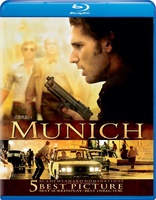
Movie rating
7.9 | / 10 |
Blu-ray rating
| Users | 4.5 | |
| Reviewer | 4.5 | |
| Overall | 4.5 |
Overview
Munich (2005)
Inspired by real events of the Black September aftermath, about the five men chosen to eliminate the ones responsible for that fateful day.
Starring: Eric Bana, Daniel Craig, Ciarán Hinds, Mathieu Kassovitz, Hanns ZischlerDirector: Steven Spielberg
| History | 100% |
| Drama | 23% |
Specifications
Video
Video codec: MPEG-4 AVC
Video resolution: 1080p
Aspect ratio: 2.36:1
Original aspect ratio: 2.39:1
Audio
English: DTS-HD Master Audio 5.1 (48kHz, 24-bit)
French: DTS 5.1
Subtitles
English SDH, French, Spanish
Discs
50GB Blu-ray Disc
Single disc (1 BD)
Playback
Region free
Review
Rating summary
| Movie | 5.0 | |
| Video | 4.5 | |
| Audio | 5.0 | |
| Extras | 3.5 | |
| Overall | 4.5 |
Munich Blu-ray Movie Review
The Cost of Vengeance
Reviewed by Michael Reuben February 26, 2015I vividly recall a conversation with a professional colleague when Steven Spielberg's Munich played in theaters in the winter of 2006. Knowing that I was a film fan, he inquired whether I had seen it and whether it was good. When I responded yes on both counts, he then asked, over and over, without pausing for an answer, "Why should I see that? Why would I want to see that?" Since he hadn't actually asked for a recommendation, I was startled by the question. It suddenly hit me that he didn't really want to know about the film; he just wanted to register his disgust at its very existence. That conversation stayed with me, as Spielberg's fictional account of Israel's hunt for the masterminds of the 1972 Summer Olympic massacre continued to enjoy mostly praise from critics but was widely savaged by political commentators, many of whom focused on unlikely details. (I finally quit reading the columnists after one found great significance in the fact that the Mossad agent played by Daniel Craig had blond hair and blue eyes and talked about "Jewish blood", thereby demonstrating, according to the column, that Spielberg was trying to portray the Israelis as Nazis.) As often happens with a drama touching on issues that are still alive and hotly contested, partisans on all sides view it through a filter—does it or doesn't it support my side?—while non-partisans just want an escapist break from horrific headlines. According to many reports, Tony Kushner, the Pulitzer Prize-winning playwright and co-author of Munich's screenplay (with Eric Roth), initially resisted Spielberg's offer to adapt George Jonas' book, Vengeance: The Story of an Israeli Counter-Terrorist Team, because Kushner didn't want his first movie assignment to be such a controversial project. Sure enough, Munich prompted denunciation of Kushner as an "Israel-hater", and there were calls by some Jewish organizations to boycott this film by the very same director who, just twelve years earlier, had received universal acclaim for Schindler's List. Ultimately, Munich was not one of Spielberg's more successful films, despite the strong reviews. Can Munich be seen differently today? I doubt it. All of the button-pushing issues that it raises still push the same buttons; if anything, the buttons are bigger and a brighter shade of red. So much depends on one's expectation for a dramatic work of fiction. Ideally, the dramatist's role is to present every character from that character's point of view. In the famous quote from director Jean Renoir, "everyone has his reasons", but presenting them in a drama doesn't mean treating them as morally equivalent. It means making an imaginative leap to gain understanding of why people do what they do. Drama doesn't offer solutions, and it doesn't serve as propaganda. At its best—and Munich is very good drama—it provokes thought and may even lead to knowledge.

Munich opens with a sharp, shocking re-creation of the events that began in the early morning hours of Sept. 5, 1972, when a group from the Black September faction of the PLO invaded the Olympic Village and seized nine members of the Israeli Olympic team, killing two more in the process. The mix of historical and recreated footage is so convincing that anyone who recalls watching TV coverage at the time may experience deja vu, especially as editor Michael Kahn cuts in reactions from viewers around the world. But Munich holds back the full details of the terrorist attack, so that the rest plays out in flashbacks, which are strategically placed to reflect the growing spiritual disarray in the leader of the covert team assigned to find and kill eleven terrorists identified by the Israeli secret service, the Mossad, as those who planned the Olympic massacre. That leader, Avner Kaufman (Eric Bana), is carefully selected for a mission personally approved by Israeli Prime Minister Golda Meir (Lynn Cohen). The decision to order assassinations does not come easily. As the Prime Minister says, "Every civilization finds it necessary to negotiate compromises with its own values". Avner and the team of four commandos assigned to him by his Mossad case officer, Ephraim (Geoffrey Rush), repeatedly find themselves struggling with that negotiation, both within themselves and among each other, as they identify, stalk and eliminate targets on their assigned list. Avner's team reflects a diversity of age, background, nationality and temperament, which allows a wide array of viewpoints and emotional reactions to be aired as they descend into the increasingly shadowy world of covert missions. The bluff bonhomie of Israeli clean-up specialist Carl (Ciarán Hinds) masks an awareness that the team's actions are a breed apart from normal military action ("It's strange, isn't it, to think of oneself as an assassin?", he says on their first meeting), while the gung-ho bloodthirstiness of South African driver Steve (Daniel Craig) gradually loses its edge as the deaths add up. A killing that the team regards as necessary but isn't on their list becomes the breaking point for both Belgian bomb maker Robert (Mathieu Kassovitz) and Danish document forger Hans (Hanns Zischler). But it is Avner on whom Munich's many conflicting elements take their heaviest toll. The son of estranged parents, routinely reminded that his father is a national hero and that he is a "sabra", i.e. a child of Israeli parents, Avner begins his mission with utter conviction, even though it means abandoning his pregnant wife, Daphna (Ayelet Zurer), and missing out on the early years of their child's life. But when the mission finally ends, he is fearful for the safety of his family (now relocated to America), having endangered so many other families. He also doubts the efficacy of what the team accomplished. He finds Ephraim's reassurances glib and empty, because Ephraim has not had to see and do what Avner has. "Stop chasing the mice inside your skull!" Avner tells one of his team at one point, but he might as well be talking to himself. The complexity of his moral quandaries is thrown into stark relief by his encounters with a Godfather-like figure known only as "Papa" (Michael Lonsdale), who represents a detachment from the world of political conflict in which Avner and his team are so bloodily immersed. A former member of the French Resistance during World War II, Papa now lives with his extended family on a remote farm in the French countryside, where he deals in information, working primarily through his son, Louis (Mathieu Amalric). He despises all governments, and his only loyalty is to family, which puts Papa in a position almost as conflicted as Avner's. Because Papa admires Avner's loyalty to family, which, like Papa's, is rooted in the soil of his native land, Papa actually prefers Avner to his own children, who share no such loyalty, having been reared solely on mercenary values. Still, as Papa says to Avner in a revealing moment (and to Louis' fury): "You could have been my son, but you're not. Remember that." This essential nexus where land, loyalty and family intersect is crucial to the conflicts in Munich, and it is expressed directly by a Palestinian terrorist named Ali (Omar Metwally), whom Avner encounters while undercover in Athens. It is probably this scene, more than any other, that has fueled charges that Munich justifies the PLO, but such charges have to overlook the increasingly brutal depictions of the Olympic massacre in the film's three flashbacks, culminating in the final, agonizing slaughter. These scenes serve as a constant reminder to the audience that the mission on which Golda Meir sent Avner's team had a genuine justification. They also show, by their placement, the steady toll taken by Avner's mission on his soul. The first flashback is Avner's own imagining of the horror, as he works up his courage to the task at hand. The second occurs in a dream, now that the terror he is avenging has penetrated his nightmares. The third occurs in an intimate moment near the film's end (in a scene much commented upon at the time), as we realize that the events of Munich have been absorbed into Avner's very flesh and blood. Spielberg minimizes nothing, neither the terrorist attack itself nor the price paid by those who struck back. Lest all this sound like heavy going—or to echo my professional colleague, "Why should I want to see that?"—Spielberg remains a master storyteller, capable of maintaining suspense and staging a taut action sequence with such apparent ease that his technique is almost invisible. The hit squad's elaborately choreographed (and sometimes improvised) attacks on their targets, with either bombs or bullets, are masterful set pieces, each with its own setup, rhythm and payoff, and every one fits precisely within the film's larger architecture so that the roughly two hour, forty-minute running time never drags. Spielberg even finds moments of comedy in the least likely places, like the Mossad officer who insists that Avner keep receipts, or the wonderful dinner table scene when Ephraim insists that the team reveal their sources of information and they all refuse. Such moments are essential against the increasingly grim tableau of violence, stealth and ultimately paranoia, as the team itself becomes a target for assassination by . . . whom? As Papa says: "We inhabit a world of intersecting secrecies, living and dying at the places where these secrecies meet." By the end, Avner trusts no one except his wife and child.
Munich Blu-ray Movie, Video Quality 
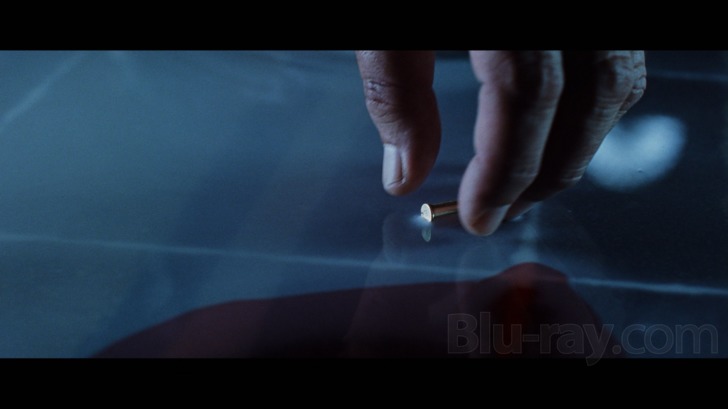
Spielberg's long-time collaborator, Janusz Kaminski, shot Munich, which, unlike most films from this period, was finished photochemically rather than digitally. In the "Portrait of an Era" featurette, Kaminski and Spielberg discuss the visual design, which involved a different color palette for each city, achieved with a combination of filters and developing techniques. Universal Home Video has created a new transfer for this 1080p, AVC-encoded Blu-ray release, which, with a minor quibble or two, is stunning. The image is exceptionally sharp, detailed and realistic, with the slightly gritty, documentary quality that Spielberg wanted for a "you are there" sense of immediacy. The palettes for the various locales are readily identifiable, if one chooses to look for them (they are meant to register subliminally), from the deep greens of Papa's farm to the sun-bleached outdoors of Israel, the blue tint of Beirut or the slight desaturation of Paris. The recreation of the events of the Olympic massacre blend so seamlessly with the historical TV coverage that it is hard to tell where one ends and the other begins. Black levels and densities look about as good as one can imagine they could be. The only negative is some occasional slight aliasing. One can see it, for example, on the steps in the opening when the PLO terrorists are trying to scale the fence into the Olympic compound. It is possible (note that I say "possible") that this results from the application of some light sharpening in some scenes, a practice for which Universal is well known, but the instances are sufficiently fleeting that it is hard to be sure of the cause. If not for this minor issue, the image would rate a perfect score. The average bitrate is 27.16 Mbps, which is very good, especially given the letterbox bars and many scenes of stillness and conversations. (Other scenes peak well into the thirties.)
Munich Blu-ray Movie, Audio Quality 
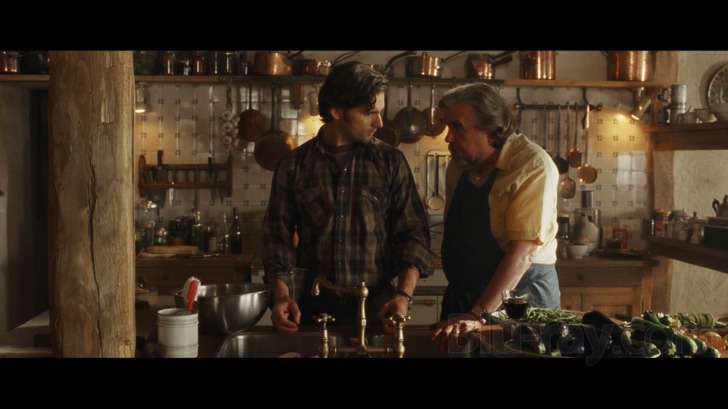
As discussed by sound designer Ben Burtt in the extras, Munich's 5.1 soundtrack, encoded on Blu-ray in lossless DTS-HD MA, strives to be both realistic (in the authenticity of its sounds) and expressive (in the way those sound are layered, emphasized, modified or sometimes isolated by dropping out the environment). The various European cities where Avner and his team hunt their targets have distinctive and active environments that come alive in the surround channels, then sometimes go quiet as key moments occur. Period automobiles, airplanes, even telephone dials make distinctive sounds. Gunfire and several powerful explosions rock the room. Even the arrival of an elevator makes a distinctive impression (Burtt discusses this particular effect in detail). As with every Spielberg film since at least Jurassic Park, there is hardly a moment without some interesting sonic detail happening somewhere, and the Blu-ray's lossless track reproduces it all. None of this comes at the expense of the dialogue, which is cleanly reproduced with its multiple accents and several subtitled languages. John Williams' beautifully elegiac score, which incorporates the national anthem of Israel, underpins and sometimes soars above the aural mix with a quiet authority.
Munich Blu-ray Movie, Special Features and Extras 
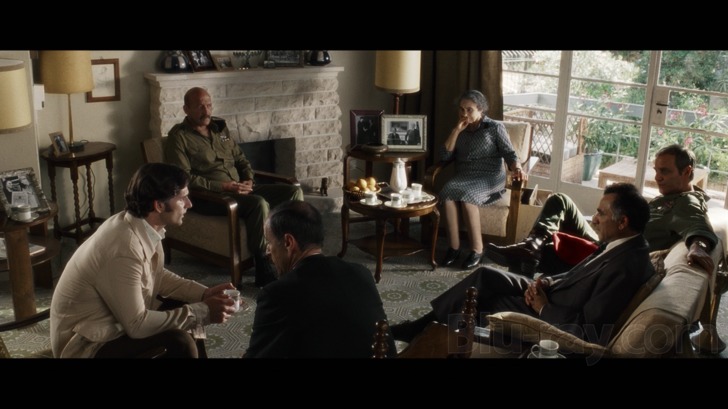
The extras have been ported over from Universal's 2006 "2-Disc Collector's Edition" DVD of Munich, of which only a limited quantity was issued. The DVD set also included a small booklet of stills, but the Blu-ray has no such paraphernalia.
- Introduction by Director Steven Spielberg (480i; 1.33:1; 4:31): This introduction by the director appears as an option when "play" is selected and also appears under "Extras". Spielberg discusses the fictional aspects of the story and his intentions in making the film. It is clear that he is attempting to respond to many of the criticisms leveled at Munich after its release.
- The Mission, The Team (480i; 1.33:1; 13:10): Producers Kathleen Kennedy and Barry Mendel, screenwriter Tony Kushner, production designer Rick Carter and Spielberg discuss the development of the script. Spielberg discusses the casting; additional interviewees included Lynn Cohen, Ciarán Hinds, Hanns Zischler, Daniel Craig, Mathieu Kassovitz, Eric Bana, Ayelet Zurer and Geoffrey Rush.
- Memories of the Event (480i; 1.33:1; 8:36): Punctuated by additional historical news broadcasts, Spielberg, Kushner and others recount the events of September 5, 1972 and their impact, especially on Israeli society.
- Portrait of an Era (480i; 1.33:1; 13:17): Spielberg and production designer Rick Carter describe how Malta and Budapest became what Spielberg calls "backlots" for the many locations of Munich, including Tel Aviv, Beirut and nearly all the cities throughout Europe where the film's action takes place. A few days of shooting in Paris were necessary for authenticity, and the farmhouse of "Papa" was a French location. Brooklyn, of course, had to be shot in Brooklyn. Costume designer Joanna Johnston discusses recreating multiple versions of Seventies clothing, and cinematographer Janusz Kaminski describes, with input from Spielberg, the film's visual design.
- The On-Set Experience (480i; 1.33:1; 14:24): A wide selection of participants describe aspects of filming, ranging from technical demands to the emotional challenges of the subject matter. Probably the most moving section is the account of recreating the Olympic massacre itself, during which the Arab actors playing terrorists and the Jewish actors playing hostages bonded deeply. A notable interviewee is Guri Weinberg, who plays his father, Moshe Weinberg, an Israeli athlete who died resisting the hostage-takers.
- The International Cast (480i; 1.33:1; 12:41): Spielberg and casting supervisor Jina Jay discuss the challenge of filling Munich's huge number of speaking roles. This featurette also includes short interviews with several notable cast members not interviewed elsewhere, such as Omar Metwally, Hiam Abbass, Michael Lonsdale and Mathieu Amalric.
- Editing, Sound and Music (480i; 1.33:1; 12:23): Michael Kahn discusses the film's editing (still the old-fashioned way with physical strips of film); Ben Burtt describes the sound design; and John Williams talks about the score.
Munich Blu-ray Movie, Overall Score and Recommendation 
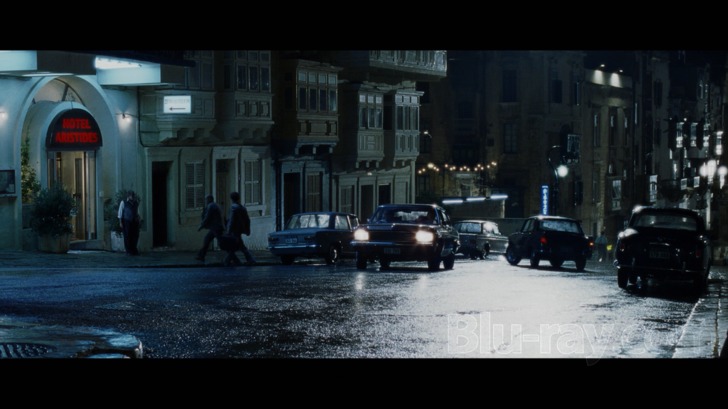
Munich is probably still as controversial now as it was upon release. Its final shot, which I will not spoil for those who have not seen it, was particularly disturbing to some American viewers, although I simply took it as a reminder that the difficult questions asked by the film are not limited to Israel. Certainly world events since the release of Munich have demonstrated its continued topicality. Spielberg was mocked in some quarters for calling Munich "a prayer for peace", but how many other filmmakers would have the guts (or the clout) to make an epic-scale film about such a radioactive subject—and the talent to pull it off? Highest recommendation.
Similar titles
Similar titles you might also like

Good Night, and Good Luck.
2005

World Trade Center
2006

Killing Kennedy
2013

Bridge of Spies
2015

Julius Caesar
1970

Suffragette
2015

Selma
2014

The Looming Tower
2018

I, Claudius
1976

Thirteen Days
2000

Nicholas and Alexandra
Limited Edition to 3000 - SOLD OUT
1971

The Promise
2016

Too Big to Fail
2011

Hotel Mumbai
2018

Anonymous
2011

The Conspirator
2010

Chernobyl
2019

J. Edgar
2011

Patriots Day
2016

Invictus
2009
